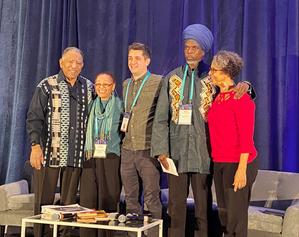 On the final day of Winter Institute 15 in Baltimore, Md., last month, a panel of Black booksellers and publishers convened to discuss the history of Black bookstores in the U.S. from the 1960s to the present.
On the final day of Winter Institute 15 in Baltimore, Md., last month, a panel of Black booksellers and publishers convened to discuss the history of Black bookstores in the U.S. from the 1960s to the present.
On the panel were W. Paul Coates, founder of Black Classic Press in Baltimore; Shirikiana Aina Gerima, co-owner of Sankofa Video Books and Cafe in Washington, D.C.; Judy Richardson, documentary filmmaker and civil rights activist who helped found Drum and Spear Bookstore in D.C.; and Nati Kamau-Nataki, co-founder of Everyone's Place African Book Store and Cultural Center in Baltimore. Joshua Clark Davis, University of Baltimore professor and author of From Head Shops to Whole Foods: The Rise and Fall of Activist Entrepreneurs, moderated the discussion.
 |
|
|
From left to right: W. Paul Coates, Judy Richardson, Joshua Clark Davis, Nati Kamau-Nataki, Shirikiana Aina Gerima
|
|
Davis began by offering some figures on the number of Black bookstores over the decades, and discussed the FBI's surveillance of Black bookstores as part of COINTELPRO (short for Counter Intellingence Program), which ran from 1956-1971. He pointed out that while many of the FBI's files are still unavailable, Freedom of Information Act requests have revealed surveillance of Black bookstores in at least half a dozen cities, and he noted that there were records on Coates, and for Drum and Spear, which operated from 1968 until 1974, there were "thousands of pages on that store alone."
Black bookstores and other activist business, he continued, emerged out of social movements of the time such as the civil rights movement and the Black Panther Party and, by the end of the 1960s, were booming despite legal persecution. Black bookstores saw something of a revival in the late 1980s and early 1990s, and Davis said that by the end of the '90s there were some 325 Black-owned bookstores in the U.S. (Coates, however, disputed these numbers, saying he doubted there were ever more than 80-100 operating at any one time.) From 2000 until around 2014, Black bookstores, as well as feminist and other activist bookstores, saw a tremendous decline in numbers due to pressure from chain superstores, online shopping and the financial crisis, but between 2014 and 2018, Black bookstores have seen the beginnings of a resurgence.
Gerima reported that her career in bookselling grew out of her career in filmmaking. She recalled that she and her husband, Haile Gerima, needed a place to make and distribute their movies (which include the 1993 film Sankofa, after which the store is named), and decided that they would sell books there as well. Lacking capital for books, they went to Kamau-Nataki's warehouse in Baltimore, where he told them to fill up a van and pay for it later. She said that one of the most important things to remember was that bookselling was part of a continuum. Saying she wants to be a "link in the chain," she explained that she may not be able to run Sankofa forever, but a good bookseller makes sure that the next generation has access to what was left behind for them.
Kamau-Nataki, meanwhile, said that he and his wife got into bookselling when they were both still students. Once they understood their "mis-education," they decided to go to the street corners to "sell books to young brothers and sisters." They opened their store, which also functions as a wholesaler of books by and about Black people, 35 years ago. Later in the discussion, when asked about the biggest challenges they face, Kamau-Nataki answered that selling drugs was a major issue in his community, but despite that, the bookstore remains a respected part of the neighborhood where no one sells any drugs.
The decision to found Drum and Spear Bookstore, Richardson recalled, grew out of what she and other civil rights activists had been doing at the Student Nonviolent Coordinating Committee. Their goal was to help "educate for liberation," and they decided to open a store on 14th street in D.C. She said the first time she saw the bookstore and met Tony Gibbons, the store's first manager, 14th street had just been tear-gassed. The store itself had only three or four bookshelves and there were no books. She and Gibbons drove up to Bookazine in New York, where there was a Black staff person who was "so amazed" that they were opening a bookstore in D.C. that he helped them build their inventory from the ground up. Later Richardson was also a major part of Drum and Spear Press, where she acquired and edited children's titles such as Bubbles by Eloise Greenfield.
Coates said he'd been in the bookselling and publishing businesses for 44 years, which began after leaving the Black Panther Party. He recalled getting together with other disillusioned activists, including former Panthers, ex-Communists, ex-socialists and ex-Pan Africanists, and trying to build a bookstore, publishing and printing business, as well as a prison literacy and education program. He called that decision a "no-brainer," saying it was a way of liberating the community. While different facets of the business fluctuated over the years, with Coates and his colleagues having to shut down "the prison part, the activist part" partially due to FBI interference, selling books and publishing titles by Black authors were always major aspects of their work.
He added that he based his publishing and bookselling model on what Drum and Spear pioneered in D.C., and he praised his fellow panelists, saying that Kamau-Nataki operates the "best-stocked Black bookstore in the country" and Gerima and her husband have carried on Drum and Spear's legacy. --Alex Mutter

